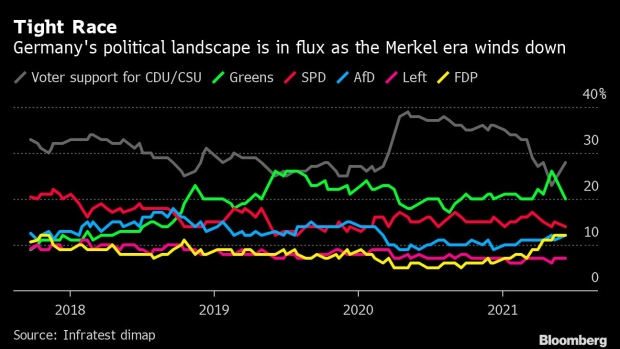Jun 12, 2021
Germany’s Greens Offer Industry a Pact to Become Climate Neutral
, Bloomberg News

(Bloomberg) -- Green candidate Annalena Baerbock said she’d unleash government aid to help German industry make the country climate-neutral, while acknowledging mistakes in her race to succeed Chancellor Angela Merkel.
The 40-year-old has suffered a harsh introduction to big-league politics after surging out of the gates following her nomination in April. She now trails in head-to-head matchups against her rivals from Merkel’s governing coalition.
After failing to fully report her income, Baerbock’s missteps took a potentially more damaging turn when it came to light that her official biography had been embellished. The damage has led to calls by some that Baerbock hand the candidacy to Greens’ co-leader Robert Habeck.
In a speech to delegates on Saturday, she acknowledged “annoying” mistakes but said she’s ready to compete with Merkel’s CDU/CSU bloc for the leadership of Europe’s biggest economy.
“Everything is possible,” Baerbock told the virtual party congress. “We have prepared for this for 40 years.”
Delegates endorsed Baerbock’s candidacy with a 98.5% share, and backed a party platform that calls for higher taxes on the rich and more government spending to finance an economic overhaul by investing in clean technologies. Baerbock also expressed opposition to the Nord Stream 2 pipeline as undermining European foreign policy.
“The products of the future will be climate neutral,” Baerbock said. “We are offering German industry a pact, a binding agreement for the state to compensate companies for the extra costs of becoming climate neutral -- made in Germany.”
After briefly leading Merkel’s conservative bloc in the polls this spring the Greens have fallen to second place, trailing by as much as 8 percentage points.
Despite the comedown the party is seen as well-positioned to play a major role in the next government. The Greens -- a distant sixth place in the last election in 2017 -- have become a national force, with Baerbock and Habeck leading a centrist shift by appealing to upscale urban voters.
The party, which was junior partner in a Social Democratic-led national government under Chancellor Gerhard Schroeder between 1998 and 2005, has a role in governing 11 of Germany’s 16 states.
The sudden rise and subsequent reality check of Baerbock’s nomination recalls the hype around Martin Schulz. The SPD candidate in 2017 initially saw a groundswell of support before his popularity faltered after a state election defeat.
Similarly, the Greens ended up a disappointing sixth place in Saxony-Anhalt last weekend, when Armin Laschet -- the conservative candidate for chancellor -- bolstered his once-struggling bid.
Baerbock’s and Schulz’s parties are on different trajectories. The SPD -- traditionally Germany’s second-strongest force -- has been on a long, slow decline along with other center-left movements in Europe. The Greens, by contrast, are the only mainstream party with a growing membership.
Because of those trends, Olaf Scholz -- Merkel’s finance minister and vice chancellor -- remains a long shot to win the chancellery for the Social Democrats, despite having the most government experience. Baerbock has never led a ministry nor run a state government -- unlike Laschet, premier of North Rhine-Westphalia.
The most likely outcome of the federal election remains a coalition between Laschet’s Christian Democrat-led bloc and the Greens as the junior partner, according to Holger Schmieding, London-based chief economist at Berenberg.
With the German economy poised for a strong upswing in the second half of this year amid falling coronavirus infection rates, the momentum favors the conservatives, who are promoting their governing credentials.
While the Greens need voter frustration to gain points, Baerbock still has over three months before the Sept. 26 election and aims to make it uncomfortable for Laschet and his allies.
“The campaign has just started, and now it’s about fighting,” Baerbock said in an interview on ARD television on Thursday. “It’s clear that when we challenge the CDU, there will be heavy headwinds.”
©2021 Bloomberg L.P.







